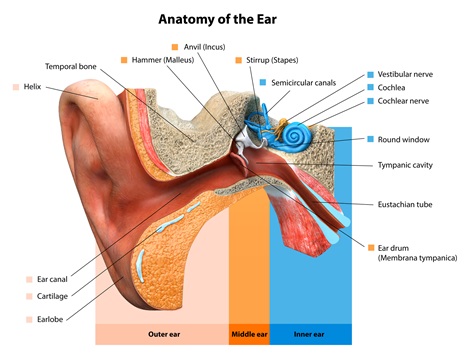Ear infections are a common problem in babies and young children. They can cause pain and discomfort, which can be difficult for parents to recognize since babies cannot directly communicate their discomfort. In this article, we will discuss the signs and symptoms that can help you determine if your baby has an ear infection.

Credit: www.hopkinsmedicine.org
Signs of an Ear Infection in Babies
It is important to note that the symptoms of an ear infection can vary depending on the age of the baby. However, some common signs to look out for include:
- Tugging or pulling on their ears.
- Crying and being irritable.
- Fever, especially in younger children.
- Difficulty sleeping or lying down.
- Fluid draining from the ear.
- Loss of balance.
- Difficulty hearing or responding to auditory cues.
How to Differentiate Between Teething and Ear Infection
Teething and ear infections can share some similar symptoms, making it important to differentiate between the two. While teething typically causes discomfort and irritability, an ear infection can cause more intense pain and other symptoms. If your baby shows any of the signs mentioned earlier, it is advisable to consult with a healthcare professional to accurately diagnose the issue.
:max_bytes(150000):strip_icc()/VWH-JulieBang-SignsandSymptomsofanEarInfectioninBabies-Standard-e7fe68103775421eadae1dfb8c063805.jpg)
Credit: www.verywellhealth.com
When to Seek Medical Attention
If you suspect your baby has an ear infection based on the symptoms mentioned, it is crucial to seek medical attention. A healthcare professional will examine your baby’s ears using a lighted instrument called an otoscope to confirm the diagnosis and provide appropriate treatment.
Treatment Options
Most ear infections in babies clear up on their own without the need for antibiotics. However, if the infection is severe or persists for more than a few days, your healthcare provider may prescribe antibiotics. They may also recommend over-the-counter pain relievers to alleviate discomfort.
Preventing Ear Infections
While it is not always possible to prevent ear infections in babies, there are some steps you can take to reduce the risk:
- Ensure that your baby is up to date with their vaccinations.
- Practice good hygiene by washing your hands before handling your baby.
- Avoid exposing your baby to secondhand smoke.
- Try to limit your baby’s exposure to other sick children.
Frequently Asked Questions Of How Do You Know If Baby Has Ear Infection
How Can I Check If My Baby Has An Ear Infection?
To check if your baby has an ear infection, look for signs like tugging or pulling on the ears, crying, and irritability. Other symptoms may include fever, fluid draining from the ear, loss of balance, and difficulty hearing or responding to sounds.
It’s important to consult a healthcare professional for an accurate diagnosis.
Do Baby Ear Infections Go Away On Their Own?
Yes, most baby ear infections clear up on their own. It’s common for them to go away without needing antibiotics.
How To Tell If Baby Has An Ear Infection Or Teething?
To differentiate ear infection from teething in babies, observe signs like ear pulling, irritability, and crying.
What To Do For An Infant Ear Infection?
To treat an infant ear infection, watch for signs like ear pain, ear pulling, crying, irritability. Use over-the-counter pain relievers and warm compresses for comfort.
Conclusion
It can be challenging to determine if your baby has an ear infection since they cannot verbally express their pain. However, by paying attention to their behavior and noticing any changes, you can identify potential symptoms indicating an ear infection. If you suspect an ear infection, it is crucial to consult with a healthcare professional for an accurate diagnosis and appropriate treatment.